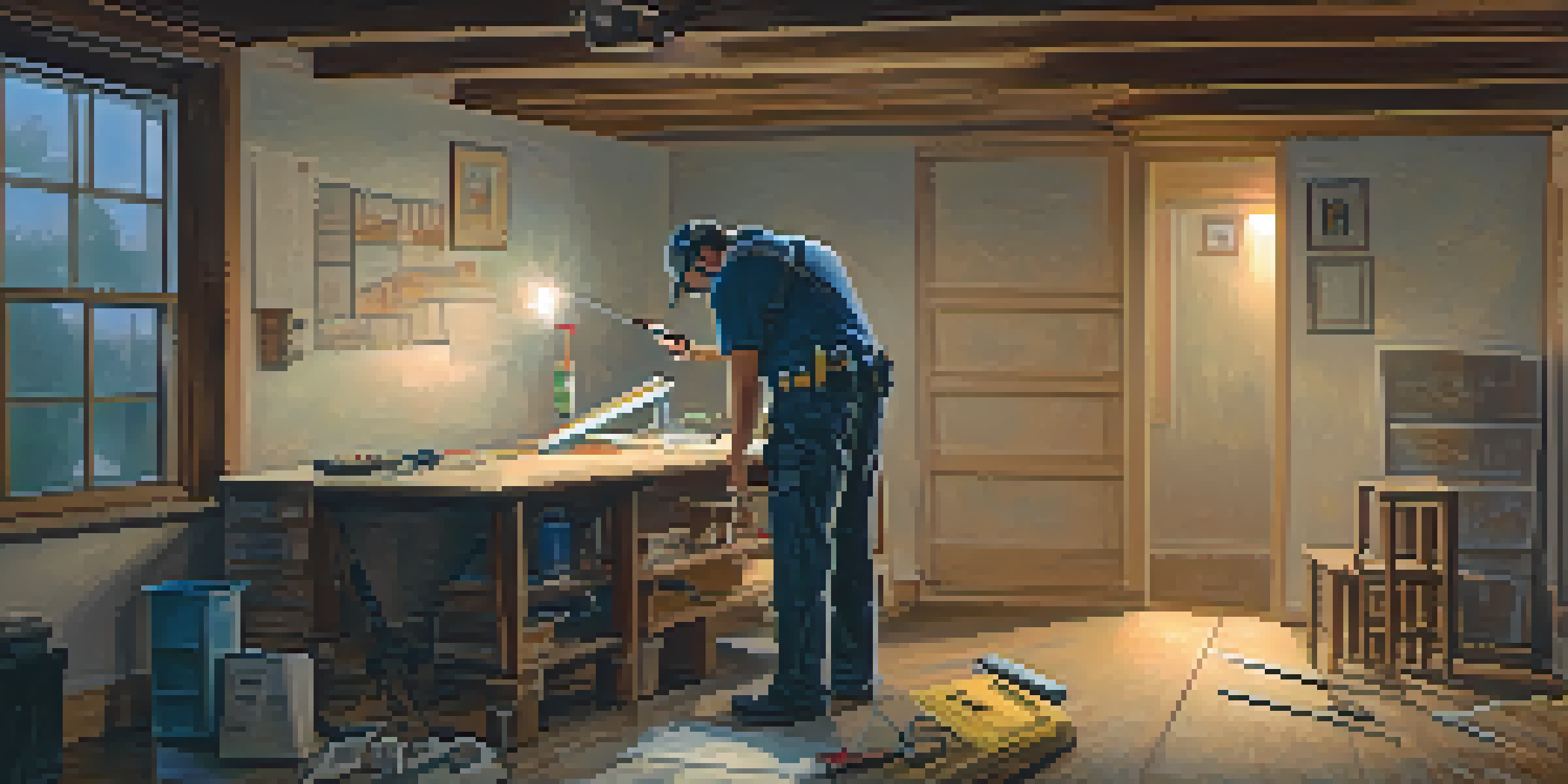The Role of Home Inspectors in Environmental Assessments

What Are Environmental Assessments and Why They Matter
Environmental assessments are systematic evaluations that determine the potential impact of a project on the environment. They are crucial for ensuring that land use and development do not harm ecosystems or public health. By identifying issues early, these assessments can save time, money, and resources in the long run.
The environment is where we all meet; where we all have a mutual interest; it is the one thing all of us share.
Home inspectors play a vital role in these assessments by providing insights into the physical condition of a property. Their expertise helps identify environmental hazards such as mold, lead paint, or asbestos, which can pose significant risks. This makes their involvement essential for safeguarding both buyers and the environment.
Furthermore, home inspectors can help homebuyers make informed decisions. By uncovering potential environmental concerns, they empower clients to negotiate repairs or reconsider their purchase. This proactive approach benefits everyone involved, ensuring responsible stewardship of our natural resources.
The Home Inspector's Toolkit for Environmental Hazards
Home inspectors utilize a variety of tools and techniques to identify environmental hazards. From moisture meters to thermal imaging cameras, these devices help detect issues that may not be visible to the naked eye. This technology is crucial in pinpointing problems like water intrusion or insulation deficiencies.

In addition to tools, inspectors rely on their training and experience to assess a property's environmental risks effectively. They know what red flags to look for, such as unusual stains, mold growth, or deteriorating materials. This expertise allows them to provide detailed reports that inform buyers about potential dangers.
Importance of Environmental Assessments
Environmental assessments are vital for safeguarding ecosystems and public health during property development.
Ultimately, the inspector's toolkit not only highlights existing issues but also helps predict future problems. By understanding the condition of a home, inspectors can guide homeowners on necessary maintenance and improvements. This proactive stance supports a healthier living environment and protects property values.
Common Environmental Issues Found by Home Inspectors
Home inspectors often encounter a range of environmental issues during their evaluations. Some of the most common problems include mold growth, which can thrive in damp areas, and lead-based paint, particularly in homes built before 1978. Both of these issues can significantly affect indoor air quality and health.
In the end, we will conserve only what we love; we will love only what we understand; we will understand only what we are taught.
Another frequent concern is the presence of hazardous materials such as asbestos, often found in older insulation and flooring materials. Inspectors are trained to recognize signs that may indicate the presence of these substances, prompting further investigation or remediation. This vigilance helps protect the health of current and future residents.
Additionally, inspectors assess drainage issues that could lead to water damage or contamination. Poor drainage can cause water to pool around the foundation, leading to structural damage and mold growth. By addressing these issues early, homeowners can avoid costly repairs and maintain a safe living environment.
The Collaboration Between Inspectors and Environmental Experts
Collaboration between home inspectors and environmental experts enhances the quality of environmental assessments. When inspectors identify potential hazards, they often refer clients to specialists for further evaluation. This teamwork ensures that any issues are thoroughly addressed and mitigated.
Environmental consultants can conduct more detailed analyses, such as soil testing or air quality assessments. These experts provide a deeper understanding of a property's environmental impact. By working together, inspectors and consultants create a comprehensive picture of the property's condition.
Role of Home Inspectors
Home inspectors are essential in identifying environmental hazards, enabling informed decisions for buyers and sellers.
This collaborative approach not only benefits homeowners but also fosters accountability within the real estate market. Buyers can feel confident knowing that multiple experts have assessed the property, leading to informed decisions and healthier living conditions.
How to Choose a Qualified Home Inspector
Choosing a qualified home inspector is crucial for a thorough environmental assessment. Start by looking for inspectors who are licensed and certified, as this indicates they have undergone proper training and adhere to industry standards. Credentials can vary by state, so be sure to verify their qualifications.
It's also beneficial to seek inspectors with specific experience in environmental assessments. Ask about their familiarity with common hazards and any relevant certifications, like those related to mold or lead testing. An experienced inspector will provide a more comprehensive evaluation and help identify potential risks.
Finally, consider reading reviews and testimonials from previous clients. Positive feedback can give you confidence in the inspector's abilities. By taking the time to find a qualified inspector, you ensure that your environmental assessment is thorough and reliable.
The Importance of Environmental Assessments for Buyers and Sellers
Environmental assessments are vital for both buyers and sellers in real estate transactions. For buyers, understanding the environmental condition of a property can prevent future health issues and costly repairs. It also allows them to make informed decisions about their investment.
On the seller's side, providing a clean environmental report can enhance the property's marketability. It demonstrates transparency and builds trust with potential buyers. Sellers who proactively address environmental concerns can often command higher prices and faster sales.
Trends in Home Inspections
Emerging technologies and a focus on sustainability are shaping the future of home inspections and environmental assessments.
In essence, environmental assessments foster a healthier real estate market. They encourage responsible practices and promote awareness of environmental issues, benefiting not just individual buyers or sellers, but the community as a whole.
Future Trends in Home Inspections and Environmental Assessments
As awareness of environmental issues grows, the role of home inspectors in environmental assessments is evolving. New technologies, such as drones and advanced sensors, are being integrated into the inspection process. These innovations allow for more precise evaluations and can uncover hidden problems more effectively.
Additionally, there’s a growing emphasis on sustainability in home inspections. Inspectors are increasingly being trained to assess energy efficiency and the environmental impact of home systems. This shift not only benefits the environment but also helps homeowners save on energy costs.

Looking ahead, the collaboration between home inspectors and environmental scientists is likely to deepen. As regulations tighten and public awareness increases, the need for comprehensive assessments will continue to rise. This partnership will be essential in ensuring safe, sustainable living environments.